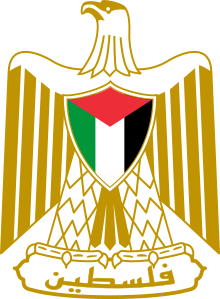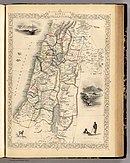| Portal • Project • Resources |
| Portal • Project • Resources |
The Palestine portal Palestine, officially the State of Palestine, is a country in the southern Levant region of West Asia, encompassing the Israeli-occupied West Bank and Gaza Strip, within the larger historic Palestine region. The country shares most of its borders with Israel, and borders Jordan to the east and Egypt to the southwest. It has a combined land area of 6,020 square kilometres (2,320 sq mi) while its population exceeds five million people. Its proclaimed capital is Jerusalem while Ramallah serves as its administrative center and Gaza City was its largest city until 2023. Arabic is the official language. The majority of Palestinians practice Islam while Christianity also has a presence. During World War I, Britain supported the establishment of a Jewish national home in Palestine, later occupying and partitioning it from the Ottoman Empire, and setting up Mandatory Palestine. During the mandate period, mass Jewish immigration allowed by the British authorities led to increased tensions and violence with the local Palestinian Arab population. By 1947, Britain handed the issue to the United Nations, which proposed a partition plan, for two independent Arab and Jewish states and an independent Jerusalem entity. Immediately after the General Assembly adopted the resolution, a civil war broke out, and the plan was not implemented. The Mandate for Palestine brought significant changes to the political and social landscape of the area, setting the stage for the conflicts and struggles that would follow. The 1948 Palestine war saw the forcible displacement of most of its predominantly Palestinian Arab population, and consequently the establishment of Israel, in what Palestinians call the Nakba. During the Six-Day War in 1967, Israel occupied the West Bank and the Gaza Strip. In 1988, the Palestine Liberation Organization (PLO) declared the establishment of the State, which later signed the 1993 Oslo peace accords with Israel, creating the Palestinian Authority (PA). In 2007, internal divisions between Palestinian political factions led to a takeover of the Gaza Strip by Hamas. Since then, the West Bank has been governed in part by the Fatah-led Palestinian Authority, while the Gaza Strip has remained under the control of Hamas. Israel has built settlements in the territories since its 1967 occupation, with the ones in Gaza being dismantled following Israel's unilateral disengagement in 2005. Approximately 670,000 Israeli settlers live in illegal Israeli settlements in the West Bank. Currently, the biggest challenges to the country include the Israeli occupation, a blockade, restrictions on movement, Israeli settlements and settler violence, as well as an overall poor security situation. The questions of Palestine's borders, the legal and diplomatic status of Jerusalem, and the right of return of Palestinian refugees remain unsolved. Despite these challenges, the country maintains an emerging economy and sees frequent tourism. It is also a member of several international organizations, including the UNESCO, International Criminal Court and the Interpol. It has been a non-member observer state of the United Nations since 2012. ( Full article...) Selected articleThe 6th Airborne Division in Palestine was initially posted to the region as the Imperial Strategic Reserve. It was envisioned as a mobile peace keeping force, positioned to be able to respond quickly to any area of the British Empire. In fact it became involved in an internal security role between 1945 and 1948. Palestine had been a British Mandate since the end of the First World War. Under the terms of the mandate, Great Britain was responsible for the government and security of the country. It had long been a stated British aim to establish a Jewish homeland in Palestine and between 1922 and 1939 over 250,000 Jewish immigrants had arrived in the country. However Arab resistance and the Second World War prompted the British to curtail immigration. The time also saw the rise of the Jewish Resistance Movement, which eventually came into conflict with the British authorities. When the 6th Airborne Division arrived in response to increasing terrorist activity, it became involved in internal security, being responsible for cordons and search operations, guarding convoys and key installations. As the situation worsened, the men of the division had to patrol the towns and cities, enforce curfews and deal with rioting by the civilian population. They also protected Jewish and Arab settlements from sectarian violence. This was not without loss to the division and several members were killed and wounded during this time. The end of the British mandate coincided with the post war reduction of the British Army back to peace time levels, and the division's numbers were gradually reduced. By the end of their tenure in Palestine, the division's strength was reduced in real terms, to less than brigade size. In 1948 it was disbanded soon after its withdrawal from Palestine. Selected picture A view of Jerusalem in the early 20th century. The earliest verified reference to the city is in the Amarna letters, which date to the 14th century BCE. Over its long history, it has been controlled by Israelites, Judaeans, Babylonians, Persians, Greeks, Hasmoneans, Romans, Byzantines, Arabs, Mamluks, Turks, and the British before being split between Israel and Jordan. Israel captured East Jerusalem in the Six-Day War of 1967, and the city remains a core issue in the Israeli–Palestinian conflict. Did you know...
Selected quoteWikiProjects
Selected biographyYasser Arafat (4 or 24 August 1929 – 11 November 2004), also popularly known by his kunya Abu Ammar, was a Palestinian political leader. He was chairman of the Palestine Liberation Organization (PLO) from 1969 to 2004 and president of the Palestinian National Authority (PNA) from 1994 to 2004. Ideologically an Arab nationalist and a socialist, Arafat was a founding member of the Fatah political party, which he led from 1959 until 2004. Arafat was born to Palestinian parents in Cairo, Egypt, where he spent most of his youth. He studied at the University of King Fuad I. While a student, he embraced Arab nationalist and anti-Zionist ideas. Opposed to the 1948 creation of the State of Israel, he fought alongside the Muslim Brotherhood during the 1948 Arab–Israeli War. Following the defeat of Arab forces, Arafat returned to Cairo and served as president of the General Union of Palestinian Students from 1952 to 1956. ( Full article...) Categories
Featured content
Featured articlesFeatured listsGood articles
Did you know? articles
Featured pictures
In the News articles
Main page featured articles
Main page featured listsPicture of the day pictures
TopicsDemographics: Definitions · State of Palestine · History · Name · People · Diaspora · Refugee camps · Arab citizens of Israel Politics: Arab Higher Committee · All-Palestine Gov-t · PLO · PFLP · Depopulated villages Today: Fatah · Hamas · Islamic Jihad · Political parties · PNA · Hamas gov-t · Governorates · Governorates · Cities · Arab localities in Israel · PNC · PLC · Palestine: West Bank · Gaza Strip · E. Jerusalem Religion: Islam · Christianity · Judaism · Dome of the Rock · Al-Aqsa Mosque · Great Mosque of Gaza · Cave of the Patriarchs · Church of the Holy Sepulchre · Basilica of the Annunciation · Church of the Nativity · Joseph's Tomb · Rachel's Tomb · Lot's Tomb · Nabi Samwil Culture: Art · Traditional costumes · Cinema · Cuisine · Dance · Handicrafts · Language · Literature · Music Related portalsReligions in Palestine Arab states Other countries Associated WikimediaThe following Wikimedia Foundation sister projects provide more on this subject:
Discover Wikipedia using
portals |




























